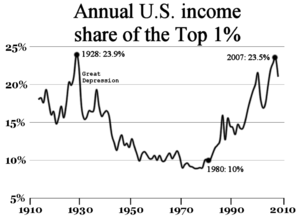
The American left is comfortable with the idea of a dynamic and unequal system in terms of economic outcomes, provided everyone can be a part of it.
by Dr Nicolas Lewkowicz, PhD, FRHistS
The cultural tensions that have dominated the American social landscape stem from the disjuncture that unfolded at the end of the 1960s. This disjuncture was the realisation of the relative geoeconomic decline of the United States, signposted by the ascent of Western Europe and Japan and the financial and political consequences of the Vietnam War debacle. This relative decline prompted the need to effectuate a reboot of the American economic system, which was duly implemented by Ronald Reagan during the 1980s. The merging of the American productive system with the world’s economy took place by means of the increased availability of petrodollars, which stemmed from the quadrupling of oil prices in the early 1970s and the shifting of the production base to the Far East.
This about-face turn coincided with a period of soul-searching, which examined the role of America as a land of liberty and its civilizational mission as the Leader of the Free World. This period of introspection resulted in the consolidation of a cultural formula that recreated the American political personality, entailing (1) the idea of the socio-cultural redistribution of goods and services through the inclusion of previously disenfranchised segments of society; and (2) the restriction of the quest of redressing societal imbalances to the cultural sphere.

This new cultural formula resulted in the entrenchment of pluralist politics, with the consequential partitioning of the public realm into non-intermingling spheres of political action. The lack of a dominant, pervasive countercultural paradigm entails the decollectivization of the societal space. The pluralist reordering of the cultural landscape reshaped the manner in which electoral politics are conducted in America. The coming to power of President Barack Obama was a momentous milestone in this process of the cultural realignment of the political sphere.
Nonetheless, the American political personality has not been affected by this cultural transition to a pluralist (albeit fragmented) political system. In essence, the American concept of freedom relies on keeping the public space as a palimpsest of different interest groups that are not necessarily in competition with one another.
The cultural shift described above facilitated the transition into a public space that is made up of a myriad of interest groups, whose voices had not been heard before the late 1960s. The cultural revolution taking place does not implicate the collectivization of the political space. Most importantly, none of the liberal/progressive causes working for the inclusion of putatively excluded societal groups seeks to alter the socio-economic system that gives America its unique place among nations.
The quest for socio-cultural amelioration does not go hand in hand with the endorsement of policies that would address the question of economic redistribution on a wholesale manner. This should reassure conservatives and libertarians. While the left works for top-down mandated socio-cultural improvement, their end game is the inclusion of the disenfranchised into the free market system.
Liberal Political Personality
Liberals and progressives are not challenging one of the main pillars of the American political personality: a socio-economic system where individuals resist the temptation of being the mass recipients of taxpayers’ dollars redistributed to the middle class. The cultural project of the American left, at least since the early 1970s, is comfortable with the idea of a dynamic and unequal system in terms of economic outcomes, provided everyone can be a part of it. In doing so, they perpetuate and enhance the promise of America as a land of freedom and opportunity.
Contact Dr. Nicolas Lewkowicz, PhD, FRHistS at his Facebook Profile or at Twitter: @DrNicLew
Leave a Reply